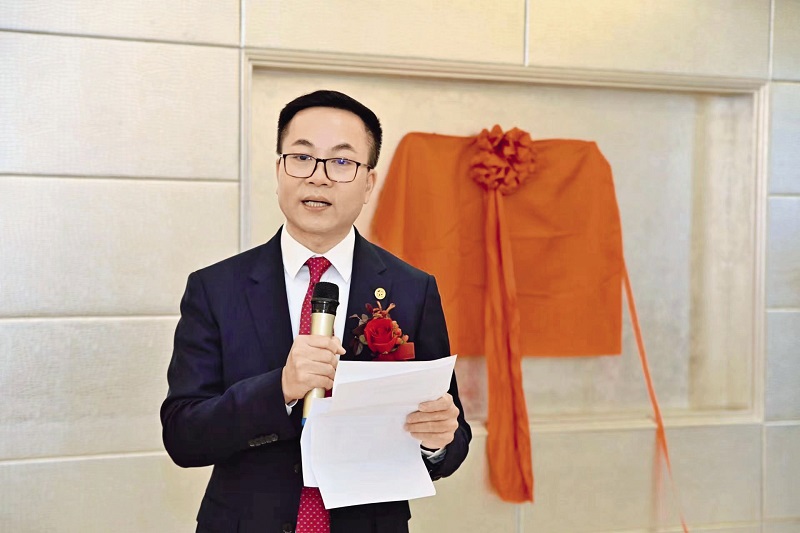More and more investors have been benefiting from the favorable business environment on Chinese mainland.
China's Hong Kong Special Administrative Region is located in the south of China and borders the mainland province of Guangdong. Ho Wing Fai, a Hong Kong native with family roots in Guangdong, is the managing director of two printing companies in Hong Kong and on the mainland. On May 31, 2022, Ho and his family returned to Guangdong’s Dongguan City, his family’s hometown, after spending 14 days of quarantine in a hotel in Guangdong’s Shenzhen City following COVID-19 protocols. He said that his family enjoyed visiting the mainland even if it meant having to follow the regular prevention and control measures of the pandemic.

A Hong Kong resident takes a photo of a stunning sunset at the top of Braemar Hill.
Returning to His Hometown
Ho’s grandfather left his hometown for Hong Kong to do business there decades ago, and his father was born in Hong Kong. Ho’s father also served as a member of the Chinese People’s Political Consultative Conference (CPPCC) in Jilin Province and Guangxi Zhuang Autonomous Region’s Nanning City, making positive contributions to the exchanges between Hong Kong and the mainland. Against this family backdrop, Ho has always held the mainland close to his heart.
Ho first visited the mainland in 1988, when his father brought him back to their hometown Dongguan to visit relatives. “With a developed economy, Hong Kong was one of the Four Asian Tigers in those days. So my father was very upset about people’s poor life in the countryside of our hometown,” said Ho. He later realized that the factories under construction at that time were the results of the implementation of China’s reform and opening-up policy since 1978. The factories played a big role in the later development of Dongguan.
Ho still remembers that during his first trip to the mainland, his father took him to visit Beijing by train. “We went to the Great Wall and the Summer Palace. We also ate Peking Duck on Wangfujing Street. What impressed me most was the flag-raising ceremony at Tian’anmen Square. My father’s face was very solemn and his eyes teared up at the event,” said Ho.
In 1992, Ho’s father moved his printing factory that had been operating in Hong Kong for many years, to Shenzhen. With the continuous expansion of the business, Ho established Artistic Printing Co., Ltd. (Dongguan), a new factory in their hometown, in 2006. “Before the Covid-19 pandemic, there were more than 700 employees in our factory,” Ho said. Over the past decades, under China’s policy of reform and opening-up and various favorable policies for Hong Kong-funded enterprises, their family business has continued to expand. Ho has always practiced his ancestral motto of “giving back to the hometown.”

Ho Wing Fai, managing director of two printing companies in Guangdong.
Second Startup
Ho’s friend Lam Tsz Hin, president of Lokhin Group and Hong Kong and Macao Compatriots Association in Nanning, has also invested in the mainland.
In 2017, invited by the United Front Work Department of the CPC Guangxi Committee, Lam participated in a delegation of Hong Kong, Macao, and Taiwan businessmen to visit Nanning. “I was deeply attracted by the unique location when I first arrived here,” said 52-year-old Lam. He has an extraordinary forward-looking attitude toward investing and doing business.
“Nanning has the only sea outlet in western China. Connected with the Southeast Asian countries by road and sea transportation, it has become a frontier for Chinese mainland to reach the ASEAN countries and the rest of the world,” Lam said. He believes that Nanning will become a new hub for economic and trade exchanges between China and ASEAN countries in the future. In 2018, Lam settled in Nanning, working on an intelligent manufacturing project with a total investment of RMB 1.2 billion, hoping to build a cluster for the high-end intelligent manufacturing industry.
“The electronic semiconductors we produce are mainly for the markets of Southeast Asian countries such as Vietnam and India. Nanning has the geographical advantage of exporting goods. In addition, the government of Guangxi has introduced many preferential policies for enterprises trading with ASEAN countries, so I chose this location for my second startup,” he said. Lam firmly believes that this investment can bring value to his company.
On January 1, 2022, the Regional Comprehensive Economic Partnership (RCEP) went into effect. It is a free trade agreement among 15 Asia-Pacific nations. “The implementation of RCEP marks the official landing of the free trade zone with the largest population, scale of economy and trade, and the greatest potential for development in the world. It has also promoted economic and trade activities between China and Vietnam, encouraging the railway connection between the two countries to make more frequent and close exchanges,” he said. Lam regards it a great opportunity for both Guangxi and investors. “It is clear that through the new land-sea corridor and the Belt and Road Initiative, Guangxi can connect the markets of 10 ASEAN countries by road and sea transportation,” he said.
Lam believes that the Guangxi Pilot Free Trade Zone, with its favorable investment policies and abundant resources, can be the first stop for Hong Kong-funded enterprises to expand the ASEAN market. Many entrepreneurs from Hong Kong have come to invest in Guangxi under his mobilization. In his words, they can hardly reject such a good entrepreneurial and business environment.

Lam Tsz Hin, president of Lokhin Group.
Shared Future
Coinciding with the birthday of his youngest son, Ho and his family went to their hometown after the quarantine in Shenzhen to visit his grandaunt. “I want my sons to know where our roots lie,” he said. Ho still remembers the scene when he and his family watched the handover ceremony of Hong Kong’s political power in front of the television on July 1, 1997. They jumped up from the sofa excitedly. For the next generation, he hopes that both of his sons can come to the mainland to study in the future and play a role in building bridges and links between the two regions.
This summer, Ho also plans to take his sons to visit some other destinations on the mainland, so that they can experience the rapid development there. “If the pandemic is effectively controlled, starting from the next year, I will regularly organize young people in Hong Kong to visit the mainland for research and study, helping them to understand the national condition so as to encourage them to participate more in its development,” he said. Ho is also the president of Friends of Nanning, Guangxi (Hong Kong) Association and Qiaotou Township Branch of Dongguan City Association of Enterprise with Foreign Investment. He hopes that more young people in Hong Kong can integrate into the country’s development and contribute more wisdom and strength to the motherland.
Ho said that the Guangdong-Hong Kong-Macao Greater Bay Area would be a good window of China to the world in the future. Since the “Outline Development Plan for the Guangdong-Hong Kong-Macao Greater Bay Area” was released in 2019, the Greater Bay Area has continued to develop, providing a broad space for the advancement of the Hong Kong and Macao youth. In particular, a series of measures, for example, the Greater Bay Area Youth Employment Scheme, Hong Kong-Macao Youth Innovation Entrepreneurship Base at provincial and municipal levels, and efforts to align each region’s rules related to professional practice, social securities, and other public affairs, have been implemented, attracting more young people to go north for development. Guangdong has established a diverse system for Hong Kong and Macao youth innovation and entrepreneurship incubation bases, attracting more than 2,300 Hong Kong and Macao-funded projects which engage with more than 3,400 young people.
“Youth from Hong Kong and Macao can benefit from the social security system, enjoy the qualifications for purchasing houses and preferential policies for entrepreneurship in mainland cities within the area, and apply for positions as civil servants and in public institutions,” Ho said. He thinks that the real sense of achievement and happiness of those young people will eventually turn into a sense of belonging to the motherland.
As the directors in association groups, Ho and Lam hope to serve more Hong Kong and Macao youth in starting businesses on the mainland.